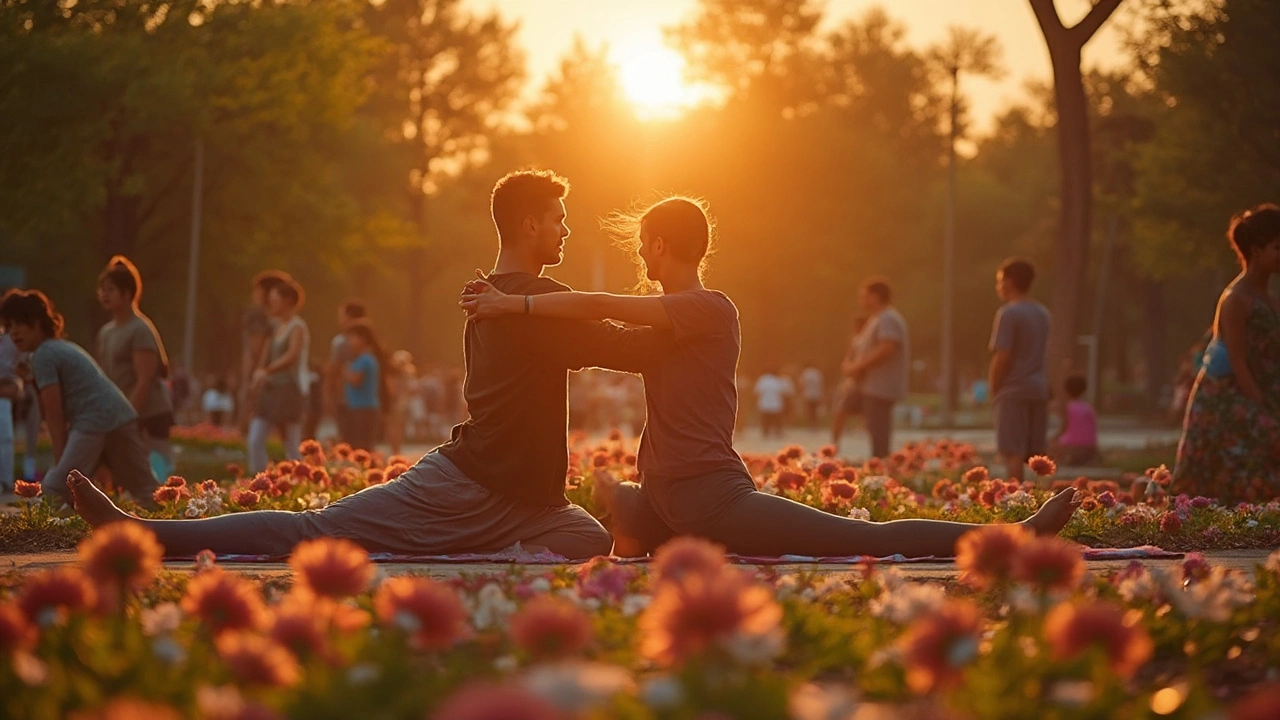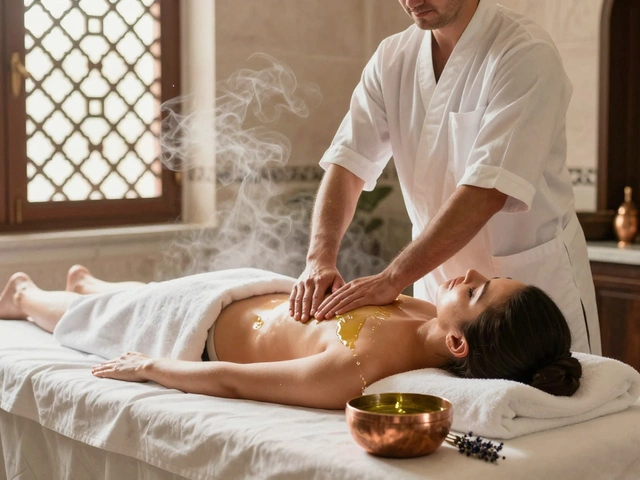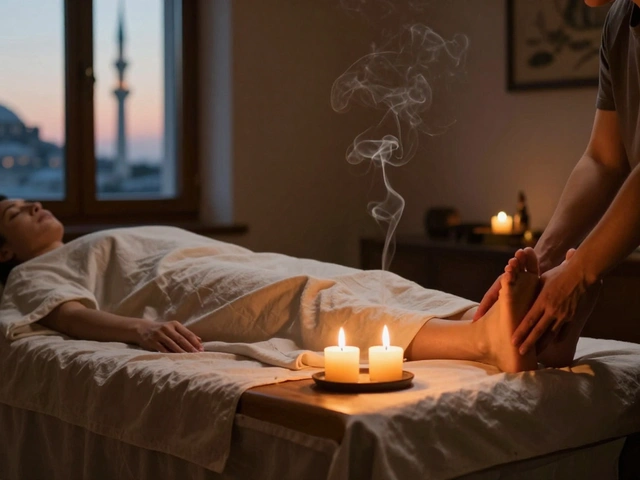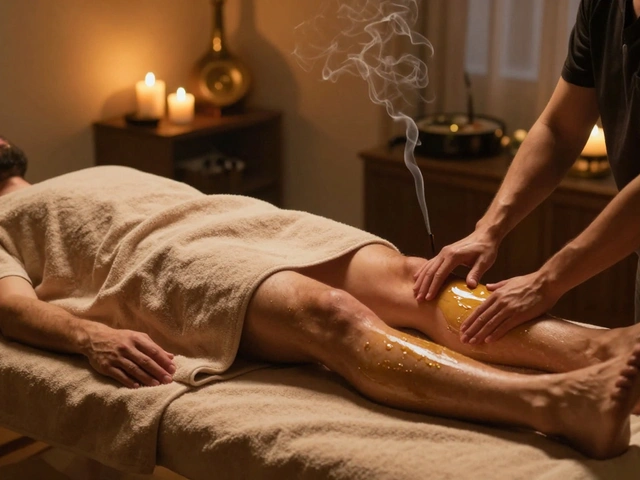Ever tried a massage where you walk out feeling both looser and lighter? Thai massage does just that. It's a game-changer when it comes to recovery and rehabilitation. Think of it as hitting a reset button for your body, blending yoga-like stretches with soothing acupressure. It's not just about relaxation; it goes deeper, helping muscles and joints recover from strain.
Now, why should you care? Because if you're recovering from an injury or just trying to shake off stress, Thai massage can be your secret weapon. It enhances your flexibility, eases muscle tension, and leaves you feeling rejuvenated. Picture this: lying down, the therapist uses their hands, elbows, knees, and even their feet to guide your body through gentle stretches. It's like yoga done for you, while you’re just soaking in the benefits.
- Key Points
- Direct Answer
- Benefits of Thai Massage
- What to Expect in a Thai Massage Session
- Safety Tips for a Great Experience
Key Points
When it comes to effective recovery, Thai massage stands out. Why? It's not just about feeling good; it has real benefits for recovery and rehabilitation. Let's break it down.
1. Boosts Flexibility
Thai massage is famous for its yoga-like stretches. These aren't just for show. They help improve your flexibility, making it easier for your body to move comfortably.
2. Reduces Tension
Feeling all tense and knotted up? The acupressure techniques in Thai massage target those stubborn areas, reducing tension and helping you relax.
3. Promotes Circulation
Good circulation is key for recovery. Thai massage techniques enhance blood flow, ensuring your muscles and tissues get the oxygen and nutrients they need to heal and stay healthy.
4. Supports Injury Recovery
If you're bouncing back from an injury, Thai massage can help speed up the process. It reduces swelling and encourages mobility, aiding your journey back to full strength.
5. Enhances Overall Well-being
It's not just physical benefits. The mental relaxation that comes from a session can greatly enhance your overall well-being, reducing stress and boosting mood.
Whether you're looking to rehabilitate an injury or you simply want to unwind, these key points make a strong case for Thai massage as a go-to method. Ready to give it a try?
The Healing Power of Thai Massage
So, what's the magic behind Thai massage when it comes to recovery and rehabilitation? It's all about its unique approach that combines stretching, pressure point therapy, and energy balancing techniques. This isn't just any massage; it's a holistic healing experience that traces its roots back over 2,500 years.
The big deal here is that Thai massage doesn't just treat the symptoms. It addresses the underlying issues by improving blood circulation, which aids in reducing inflammation and speeding up the healing process. Plus, the yoga-like stretches increase flexibility, helping to prevent future injuries. This is why it’s gaining so much love in the recovery scene.
Imagine you've got a nagging sore spot from an old injury or a persistent tension from hunching over your computer. Regular sessions of Thai massage can help break down scar tissue and relax those tight muscles, giving you a broader range of motion and relief from pain.
Why It Works
You might wonder why this approach is so effective. It's because Thai massage uses the body's energy lines, known as 'sen,' to restore harmony in the body. By applying pressure on these lines, it promotes the flow of energy, making way for swift recovery.
| Aspect | Benefit |
|---|---|
| Flexibility | Enhances range of motion, reducing injuries |
| Circulation | Improves blood flow, speeds up recovery |
| Relaxation | Reduces stress, enhances mental clarity |
Curious about trying this out? Give it a go next time you're looking to recover or rejuvenate. It's more than just a massage – it’s a step towards holistic healing.

Benefits of Thai Massage
When it comes to recovery and rehabilitation, Thai massage isn’t just about stress relief—it's about achieving real physical benefits too. Here's why this ancient practice is stealing the spotlight.
Improving Flexibility and Range of Motion
With its yoga-like stretches, Thai massage helps improve flexibility and enhances joint range of motion. Imagine your body just letting go of stiffness and feeling more fluid. This is especially great if you’re dealing with tight muscles from workouts or even long hours at a desk.
Boosting Circulation
Thai massage involves rhythmic compression and acupressure, which can boost your blood circulation. Better circulation means more oxygen and nutrients get delivered to tissues, speeding up the recovery process and giving you that revitalized feeling.
Relieving Muscle and Joint Pain
By focusing on specific problem areas, Thai massage can alleviate chronic muscle and joint pain. If you’ve got old sports injuries or just wake up sore, this massage might offer the relief you’ve been chasing.
Promoting Relaxation and Reducing Stress
Stress can wreak havoc on your body, but Thai massage promotes relaxation through gentle pressure along energy lines. It's like hitting pause and taking a breath, allowing your mind and body to unwind.
Supporting Mental Clarity
Releasing the physical tension often clears mental fog and enhances focus. A relaxed body can lead to a clearer, more alert mind—perfect when you need to solve that next big problem or simply enjoy the moment.
So, whether you’re targeting physical recovery or looking for a mental reset, Thai massage provides a host of therapeutic benefits that go beyond the surface.
What to Expect in a Thai Massage Session
Walking into a Thai massage session, you're in for a unique adventure. It's not your typical lie-down-and-relax kind of massage. Instead, it feels more active and engaging, almost like you're participating in it. You might find yourself in loose-fitting clothes instead of stripping down; this helps you move with ease during the session.
The room is usually calming, with dim lights and soft music—or maybe some gentle nature sounds. All of this sets up a cozy atmosphere. But let’s get to the good stuff: what actually happens during a session?
Preparation and Introduction
First off, the therapist will probably ask you a few questions about your health background and what you're hoping to achieve. It’s crucial to be open and honest—after all, your therapist needs to know if you’re there for recovery, rehabilitation, or just to melt away the stress of life. This way, they can tailor the session to your needs.
The Massage Experience
From here, expect more than just simple rubbing. Thai massage combines acupressure, Indian Ayurvedic principles, and assisted yoga postures. The therapist uses hands, knees, legs, and feet to move you into a series of stretches. It’s dynamic, and yes, a little like being folded into a human pretzel—but in a good way!
- Starting with your feet, they'll work their way up, applying pressure along energy lines, or 'Sen', which are believed to be pathways in the body that influence mental and physical wellness.
- You might find yourself lying on a firm mat instead of a table. The mat gives therapists the space to move freely around you.
- As it progresses, you'll notice your muscles releasing tension. The guided stretches boost flexibility and circulation. You might be asked to assist with some movements, kind of like a gym partner!
Post-Massage Feel
After the session, folks often feel a sense of calm, with increased flexibility and a reduction in muscle tension. It’s almost as if the world hit pause for a bit. Drink water post-session to help flush out any toxins released during the massage.
In terms of recovery and rehabilitation, regular sessions can aid in chronic pain management and improve overall physical function. So, if you’re in need of healing—or just some serious unwinding—Thai massage might just be the solution you didn’t know you were seeking.

Safety Tips for a Great Experience
Diving into the world of Thai massage for the first time? It's smart to keep a few safety tips in mind for the best experience. Your safety is important, so let's make sure your Thai massage is as relaxing and healing as it should be.
Communicate with Your Therapist
Don't shy away from talking to your therapist. Let them know if something feels uncomfortable. The goal is relaxation and healing, not enduring pain. Being open helps tailor the session to your needs.
Know Your Limits
While Thai massage can be invigorating, it's important to recognize your own limits. If you're recovering from an injury, consult a healthcare professional before scheduling a session. Telling your therapist about any medical conditions or issues is crucial for avoiding discomfort.
Hydration is Key
Keep hydrated before and after your session. Drinking water helps flush out any toxins released during the massage. Plus, it's a good habit that keeps your muscles happy and flexible.
Dress Comfortably
Wear loose, comfortable clothing. Thai massage involves a lot of stretching, so you'll want to be in attire that lets you move freely. Usually, massages take place fully clothed, so skip anything tight or restricting.
Timing Matters
Consider timing your session carefully. Don't schedule immediately before or after a big meal. Allow some time for digestion before diving into the stretches and acupressure of a Thai massage.
Avoid Right Before Big Plans
If you've got a busy day lined up, book your massage after your plans. You'll feel relaxed and a bit too laid back to jump straight into high-energy activities afterward.
Listen to Your Body
Pain is not part of the process. If at any point you feel discomfort, let your therapist know. Thai massage is about gentle healing and should never feel harsh.
| Step | Action |
|---|---|
| 1 | Consult with a healthcare professional, especially if you have medical conditions. |
| 2 | Stay hydrated before and after your session. |
| 3 | Wear loose, comfortable clothing to allow for stretching. |
| 4 | Communicate openly with your therapist about any discomfort. |
| 5 | Avoid massages immediately after a meal or before demanding physical activities. |
Armed with these tips, you’re prepped for a session that leaves you feeling refreshed and rejuvenated. Enjoy your time, and may your recovery and rehabilitation journey be smooth and beneficial!



